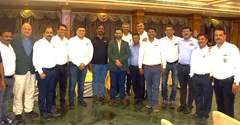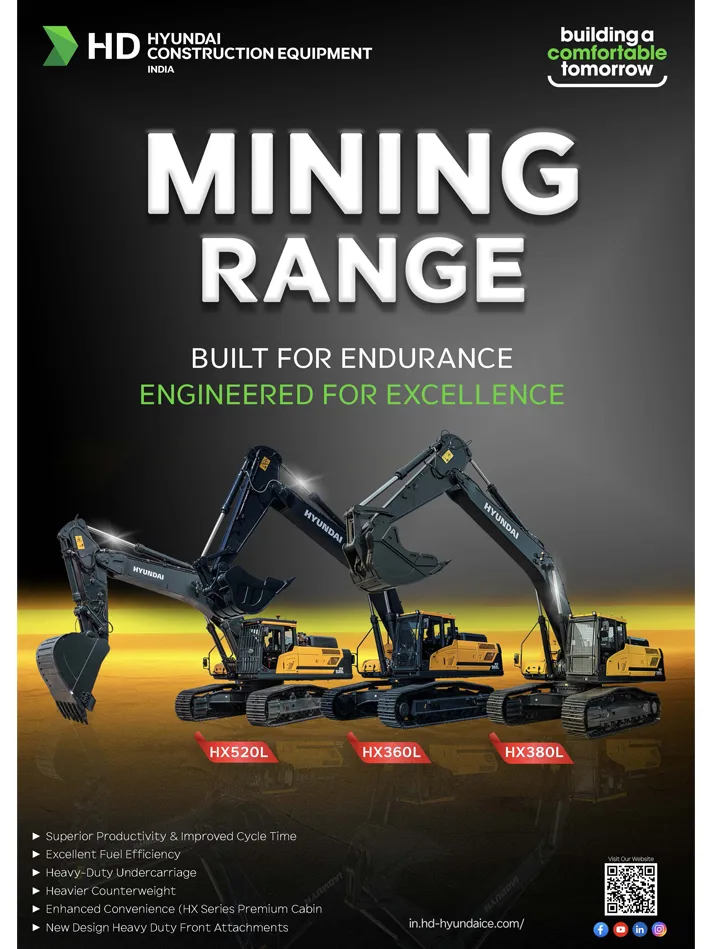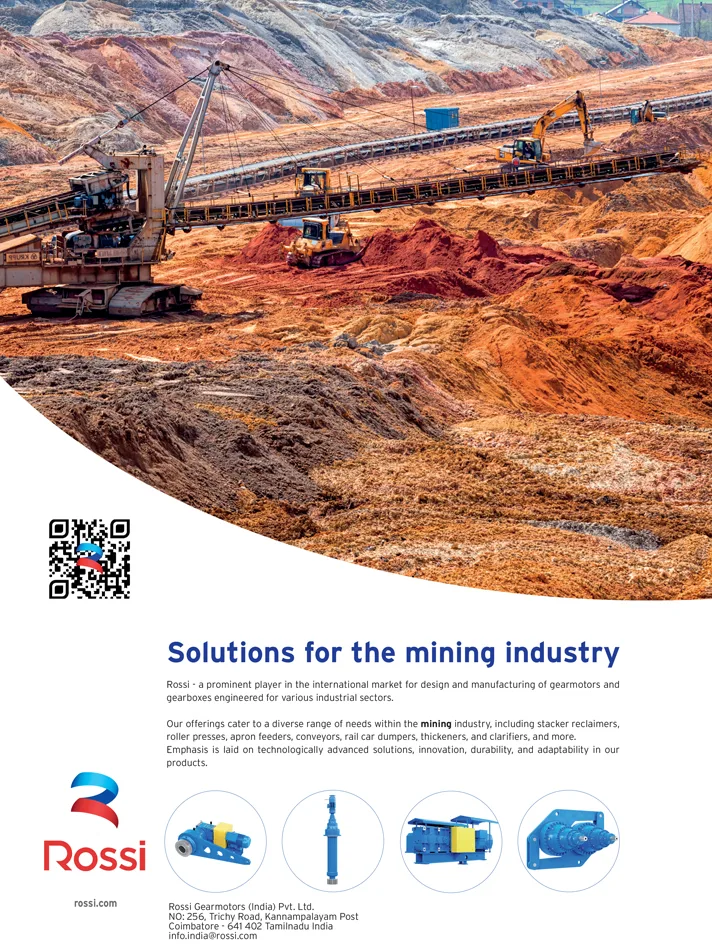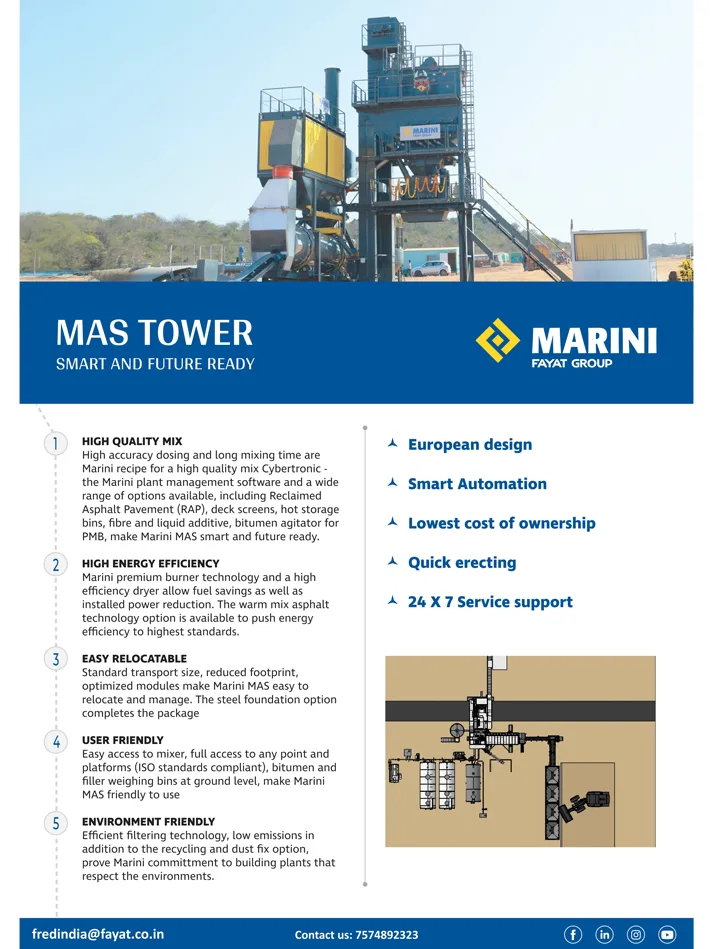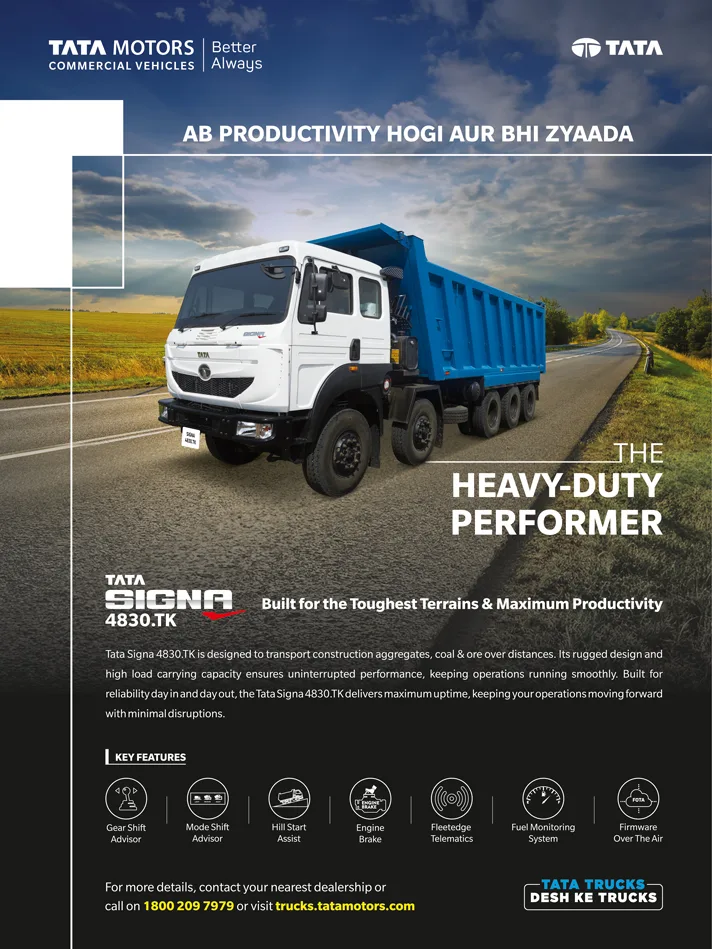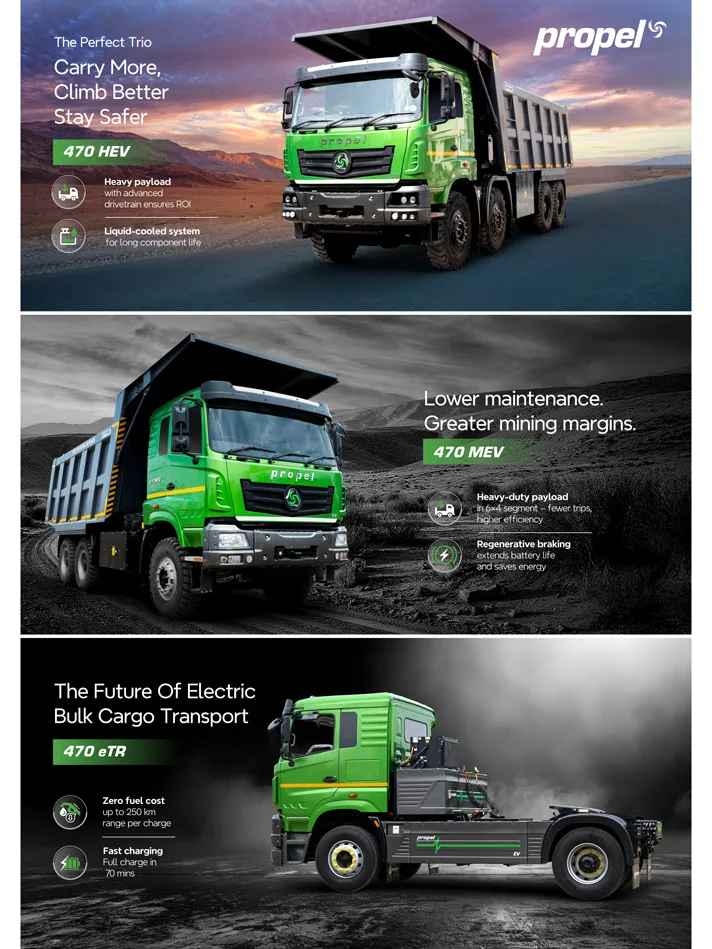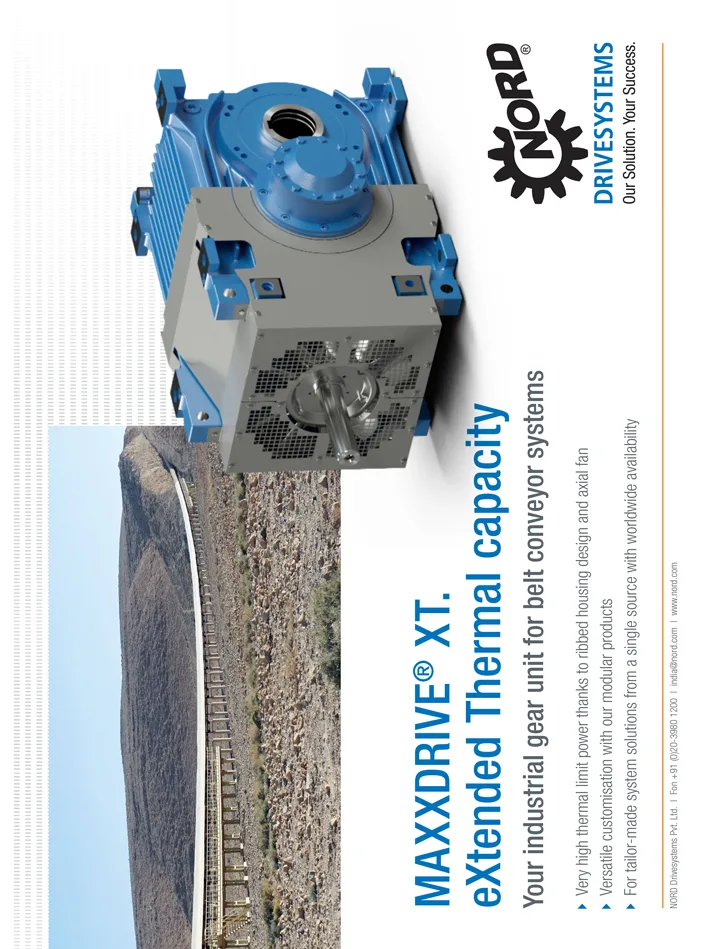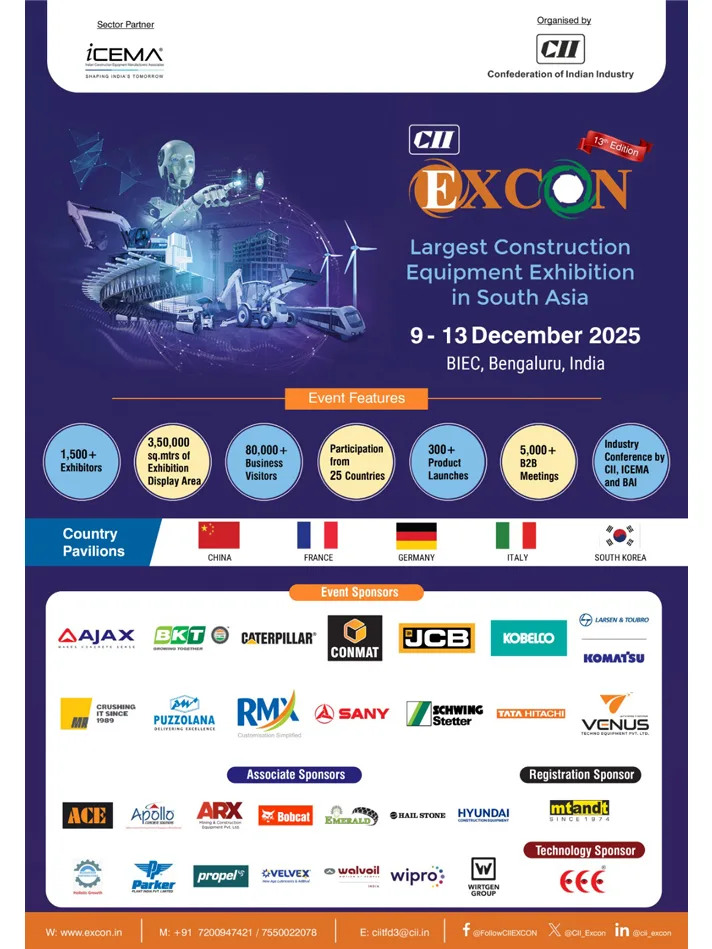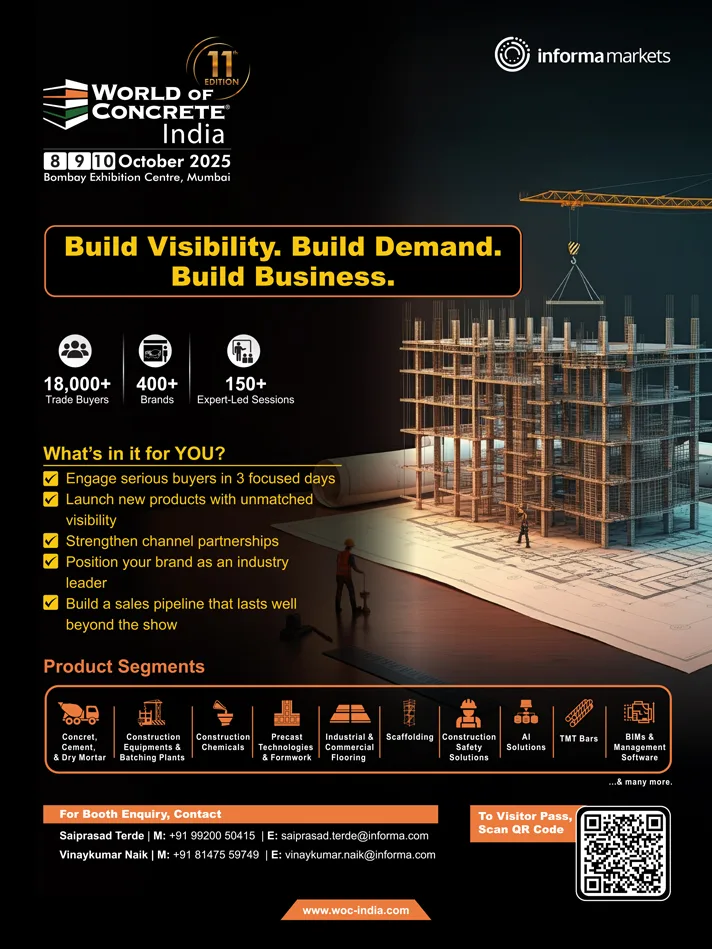Hybrid focus for crushing equipment OEM
SBM Mineral Processing presented its lastest hybrid crushers at this year’s ConExpo-Con/Agg trade fair in Las Vegas, United States, with the JAWMAX 400 mobile jaw crusher taking centre-stage.
The JAWMAX 400 mobile crusher has an operating weight of 88 t and a feed capacity of 400 tph, with transport dimensions of 44 ft (13.4 m) in length, 12 ft (3.6) in width and 11.8 ft (3.6 m) in height.
Like all of the company’s mobile models, the plant “features one of the most advanced diesel-electric drive concepts on the market,” said SBM.
“A combination of fuel-efficient onboard diesel and performance-tuned generator powers the plants’ largely electrified crushing, screening and conveying equipment.” “Despite class-leading production capacities, this ensures massive savings in fuel consumption compared with diesel-hydraulic or only partially electric competitor plants thanks to low engine speeds.
“Less hydraulics also means less risk of failure, lower maintenance and parts inventory costs, and thus higher availability with further optimized operating costs, reaching overall savings from 40 to 75%.” The manufacturer will also showcase its latest – and largest – mobile impact crusher, the REMAX 600.
Debuted in Europe at Bauma 2022 in Germany, SBM said the REMAX 600 model would “soon pave the way for “autonomous crushing”. The REMAX 600 model has a maximum feed capacity of 00 tonnes of material an hour and its 1400-impact crusher can handle material feed sizes of up to 900 mm. Capable of producing up to five fractions in one cycle, the machine is fitted with a diesel-electric hybrid drive.
This comprises a 15-litre Stage V Cummins turbodiesel engine and a 553 kVa generator that powers a 250 kW electric motor, which drives the crusher’s conveyors, screens and hydraulic systems.
It also includes a host of technological features, with “Extensive sensor technology, including cameras,” said SBM. These constantly record and evaluate the “feed material as well as intermediate and end products”.“In real time, those values reach centralized digital labs at SBM, where they are further analysed. Necessary adjustments are then made on the “digital twin” of the working machine and re-transmitted directly to the REMAX 600 in the field.”
The new REMAX 600 expands the company’s mobile impact crusher product line, joining the REMAX 200, 300, 400 and 500 models. SBM, which will be exhibiting at booth S5600 in the Silver Lot, (Silver Lot, Booth: S5600), will also display the REMAX 600’s smaller sister model, the REMAX 400 mobile impact crusher.
Palfinger UK expands with THS acquisition
Hydraulic loader crane specialist Palfinger UK has acquired Truck Hydraulic Services Ltd in the United Kingdom. The acquisition of THS, based at Bardon in the English Midlands, was effective 1 April.
Commenting on the deal Alan Johnson, Palfinger UK managing director, said, “The acquisition of Truck Hydraulic Services Ltd aligns with Palfinger UK’s strategic aspirations to bolster its support of field service operation and workshop capabilities throughout the Midlands. Bridging the gap between depots in Devizes and Bradford creates an even more accessible business with scale to meet our customer’s needs.”
Palfinger UK confirmed all THS staff were taken on as Palfinger UK employees. The UK distributor for Palfinger lorry cranes and Epsilon construction, recycling and forestry cranes is the largest in the country. It offers in-house assembly and mounting of cranes on trucks, body-building and servicing.
Kobelco aims for big performance from new small machines
Kobelco Construction Machinery has introduced the next generation SK34SR-7 and SK39SR-7 to its mini excavator range.
According to Kobelco, mini excavators can play an important role on any jobsite despite their small size. Their working footprint enables access to restricted spaces and the inside of buildings, while they can also provide key support to larger construction projects. With this in mind, Kobelco continually reviews and improves its mini excavator range to meet increasing operator demands.
The new Kobelco SK34SR-7 and SK39SR-7 replace the previous SK30SR-6E and SK35SR-6E and are said to offer increased engine performance, improved operability, an updated cabin interior and easier maintenance.
Engine output has been increased from 18 to 19 kW, and the size of the bucket cylinders from 65 to 70 mm, resulting in a 15% increase in bucket digging force to 32 kN. In addition, the boom cylinder bore has been increased from 80 to 85 mm for improved lifting capacity. Product manager Wesley Elverding said: “We’re always listening to our customers to understand what they need from their mini excavators.
“The introduction of the new SK34SR-7 and SK39SR-7 demonstrates how we are developing our mini excavator technology and machine concepts to better suit the needs of our operators as well as more demanding jobsite conditions.”
JCB puts hydrogen combustion into action
When it comes to new product innovation, you can often learn as much from failures as from successes. This has certainly proven the case in development of hydrogen combustion engine technology. With numerous attempts made in the ’90s to produce a working model, 76 technical papers describing what worked and, more importantly, what didn’t have been instrumental in pointing future development efforts in the right direction.
“We studied the 76 papers – experiments by universities, top companies – and wh-at we realized when we got to the end of it was that the majority of those engines were conversions,” said Tim Burnhope, chief innovation and growth officer at JCB. Most attempts involved trying to put hydrogen into an existing spark ignition engine. “You wouldn’t put petrol in a diesel engine and expect it to work. And that’s really what people have been doing with hydrogen.
“The problem was the combustion was probably high pressure, high temperature. The fuels were probably too rich. So, the outcomes were fairly poor.”
After dissecting the studies, JCB engineers identified 11 key technical challenges that needed to be addressed. Of these, the majority, said Burnhope, came back to how you combust hydrogen in the first place, including the need to combust at much lower temperature and pressure and at a very lean mix of hydrogen to air.
“The only way you get the large content of air is to have a turbocharger that’s very powerful that can put a lot more air through the system,” Burnhope said. “In the ’90s, those turbochargers weren’t available, so the majority of the people who were doing the experiments didn’t have the ability to change the injection process or the turbocharger process to supply the air… And the one thing they definitely didn’t have was the computing power to be able to run simulations.”
Fast forward a couple of decades to 2020 when such barriers no longer existed. Working closely with the University of Aachen in Germany, JCB took advantage of available computer simulation technology to identify the precise elements of compression ratio, temperature, pressure and fuel-to-air mix required – resulting in what Burnhope described as “an amazing breakthrough.”
Principles of hydrogen combustion
That breakthrough is a “first-principles hydrogen combustion solution,” in which roughly 70% of the engine appears the same as its diesel counterpart.
“Essentially, from the top of the block down… it’s exactly the same characteristics so the engine gives the same output,” Burnhope said. “What we’ve done really is take off today’s combustion process and put a new combustion process on the top.”
Dynapac to launch new series of tandem rollers
Dynapac is to begin production of a new series of tandem rollers in its 6, 7 and 10 tonne classes by the end of 2023.
The CC2200 VI – CC3800 VI Tandem Asphalt Roller range, which the company says it designed for maximum operational ease and driver comfort and safety, will come with a drum width of 1500 to 1680mm and will also be available in split drum and combi versions. The new machines will be equipped with a number of features that Dynapac claims will “ensure optimal compaction results, operational efficiency, and driver convenience” as well as a number of technological additions. For operator safety and comfort, Dynpac has included a full-colour seven-inch touch display and easy access to all controls, 360 camera for improved visibility for the operator and a low mounted corrosion-free water tank, Elsewhere, the CC2200 VI is fitted with Dynapac’s Seismic feature which automatically determines the optimal frequency for any compacted material, constantly monitors the variations and automatically adjusts to changing conditions.
The rollers are also fitted with Dynapac’s control and documentation system Dyn@Lyzer and an open interface for 3rd party compaction control systems provided by Topcon.
Dynapac, which is a subsidiary of Fayat Group, has also recently announced the launch of a range electric-powered vibratory plates, which have been added to its Z.ERA portfolio of emission-free machines.
Washing solutions to ‘boost productivity’
CDE, a supplier of sand and aggregate washing solutions for the waste recycling and natural processing sectors, has been showcasing its washing solutions that it says are “transforming dirt into dollars” across North America. The company showcased its CustomCare plant technology at ConExpo, which it says supports customers to maximise plant uptime and throughput through the use of diagnostics and access to real-time data and feedback.
Presentations across the show included 360-degree digital demonstrations exploring a range of CDE wash plants in operation across North America in the natural processing and waste recycling sectors. Darren Eastwood, Business Development Director at CDE, says, “We’re seeing rapid growth in the waste recycling space and are awash with waste recycling enquiries as a result. CDE is leading the charge in supporting the industry to realize value from construction, demolition and excavation waste, as well as by-product from the crushing and screening processes.
“These materials are often overlooked or discarded, but they hold significant commercial value. With the efficiency and reliability offered by our proven washing solutions, materials producers can unlock that value to transform these materials into high-quality recycled sand and aggregates for construction use and boost profitability.”
Roll Group adds high capacity gantry lifting system
Netherlands headquartered Roll Group has added a super heavy lift gantry tower system to its fleet.
It is at the fabrication stage and due to be operational in the middle of 2023. Existing strand jacks from the Roll Lift fleet will provide the lifting muscle for the in-house designed system. Capacity varies depending on the height but the company has targeted being able to lift 2,400 tonnes to a height of 100 metres, without guy wires. Components of the system can be combined to produce multiple configurations of height, width, capacity, and shape to suit all sorts of heavy lifting applications. Capacity will be greater than 2,400 tonnes at lower height and less than this at heights above 100 metres.
Current capabilities
At this stage enough components are being made to assemble towers 100 metres tall but extra mast sections can be added later. The current maximum span is 23 metres but this can be increased by adding more header beam sections in future. The system components are being fabricated in Singapore, Indonesia and Thailand and will be verified by Lloyd’s in design, fabrication and testing, Roll Group explained.
Its first project is in the petrochemical industry for the installation of tall reactors. In the renewable energy sector the system can be of use in the integration of jackets or for the load out of floating offshore wind farm components. It is also ideal for the installation of goliath cranes, Roll Group said. An assist crane is used to assemble the tower. That same crane can then be used for tailing the vessel during the main lift. Ground preparation for the base is extremely important to keep the towers stable and to guarantee the safety of the whole system, the company said. This means the towers need to be supported by a piled concrete foundation, specifically designed for the loads.
VE Commercial Vehicles sells 11906 units in March 2023
VE Commercial Vehicles Ltd. (A Volvo Group and Eicher Motors joint venture) recorded sales of 11906 units in March 2023 as compared to 8803 units in March 2022 recording a growth of 35.2%. This includes 11677 units of Eicher brand and 229 units of Volvo brand. Following are the key highlights for March 2023:
Eicher branded trucks & buses have recorded sales of 11677 units in March 2023 as compared to 8581 units in March 2022 representing a growth of 36.1%.
In the domestic CV market, Eicher branded trucks & buses have recorded sales of 11263 units in March 2023 as compared to 7929 units in March 2022, representing a growth of 42%.
On the Exports front, Eicher branded trucks & buses have recorded sales of 414 units in March 2023 as compared to 652 units in March 2022, representing a decline of 36.5%
Volvo Trucks and Volvo Buses have recorded sales of 229 units in March 2023 as compared to 222 units in March 2022, representing a growth of 3.2%.
German contractor boosts upward reach with Volvo CE
A custom-made quick-change boom system on its Volvo Construction Equipment (Volvo CE) EC380E HR is helping German demolition and earthworks specialist Austen GmbH on demolition projects with a range of reach requirements.
With an operating weight of just over 50 t, the Volvo EC380E HR is a vital piece of equipment for Austen, a family-run business now in its third generation.
Projects include the Markt Cadolzburg site in the city of Fürth in the southern German state of Bavaria, which covers around 113,000 sq m (1.2 million sq ft), and where around 10,000 t of concrete have already been reprocessed.
“It was clear that sooner or later we would need more upward reach,” says business manager Dominik Austen.
“But before we bought one, we wanted to see a large machine for ourselves.”
With no EC380E HR in the area, Stefan Kirsch, sales manager of equipment dealer Robert Aebi four directors from Austen 700 km (435 miles) north to Rotterdam in the Netherlands.
While the trip proved worthwhile in terms of the machine, a quick-change system didn’t yet exist for excavators of this size.
“You can’t get something like that off the shelf, you have to build it,” said Stefan Kirsch.
“We had to think about everything down to the smallest detail. Where should the quick-change couplings be placed? How should they be attached?”
Within a year, a team from the two companies had developed the first Volvo EC380E HR with an oil-free quick-change boom system.
At the customer’s request, the machine also received a protective coating. And a custom-made big rock spoon was also designed and developed by Dominik Austen in collaboration with the spoon builder to enable them to rip out foundations even more effectively. Thanks to the modifications that were made to its EC380E HR, Austen can switch between booms in just 30 minutes, which it describes as a huge benefit for day-to-day operations. With the long front equipment, the excavator can reach a maximum working height of around 24 m (78 ft). For work at lower elevations or on foundations, Austen switches to its earthmoving boom.
Magni introduces new fixed boom telehandler
Magni Telescopic Handlers launched its new 10,000-pound capacity fixed boom telehandler for the North American market.
The TH 5,5.15 fixed boom model features a maximum lift capacity of 12,100 pounds and a maximum lift height of 48 feet, 7 inches. The unit brings Magni’s total TH series up to six units with maximum lift heights ranging from 25 to 75 feet and maximum lift capacities of 11,000 to 13,200 pounds. The TH lineup offers a range of attachments including forks, winches, jibs and work platforms.
Magni’s Heavy Lift model HTH 16.10, provides a maximum lift capacity of 35,200 pounds and a maximum lift height of 31 feet, 2 inches. The HTH 16.10 is powered by a Volvo Penta Tier 5 engine that boasts 218 hp providing the power needed for applications within heavy industry, mining, heavy logistics and more.
In addition, a complete line of attachments is available for the HTH models including forks, winches and hooks.
Terex rough terrain crane to Hungary
Hungarian-based Grin Bau has purchased a new Terex RT1045L rough terrain crane.
The crane will be used for industrial and agricultural construction projects, as well as other professional works.
First project
One of the first jobs will require the crane to lift formwork for concrete during the construction of an acqueduct.
Grin Bau said constructing the acqueduct was made easier by the versatility of the crane. Its 45 tonne capacity coupled with the main boom length of 37.4 metres made it ideal for lifting on such sites. The RT 1045L is a compact machine which aids work in confined spaces, or even inside buildings as it has a zoning system. The crane also comes with Terex’s T-Link telematics software, which offers real time data and improved machine management.
Stephan Wjikmans, regional sales manager at Terex RT Cranes said, “Grin Bau purchased the RT 1045L due to the fact that our cranes can easily work in tight spaces and handle off-road job sites very easily. We have no doubt that with the world class design and manufacturing that went into our RT 1045L, Grin Bau has chosen the right crane”.
Doosan Bobcat shows new branding, hydrogen fuel cell forklift at ProMat
Doosan Bobcat Inc. highlighted the future of its material handling equipment lineup at ProMat 2023, an exhibition for professionals working in the supply chain, warehouse and distribution industries. In addition to showcasing new branding, the company featured its newest hydrogen fuel cell-powered concept machine.
The 6000-lb.-capacity B30X-7 hydrogen fuel cell concept forklift will be developed under the Bobcat product portfolio as part of the transition of Doosan Industrial Vehicle (DIV) products into the Bobcat trade dress. The forklift was initially announced as a research and development project in 2022 by Doosan Bobcat.
“As a company, we are evolving in bold ways to meet our customers’ toughest challenges by offering innovative solutions for a more sustainable future,” said Scott Park, Doosan Bobcat CEO and vice chairman. “Alternative energy products — such as hydrogen or electric — give customers options, while also leading the way toward a more sustainable future and greener tomorrow.”
Longer operating times and faster refueling make hydrogen fuel cell forklifts ideal for applications in such applications as warehouses operating multiple shifts, the company said. It noted that fuel cells can be refueled in three minutes or less and the forklift can return to work immediately following, with no cooling time required. The forklift can also run longer and at a higher, steady voltage. The hydrogen fuel cell forklift concept machine is a joint venture development between Doosan Bobcat and Plug (formerly Plug Power). It is initially being developed as a Class 1 forklift model, with opportunity across various forklift model offerings and classes in future. Also showcased at ProMat was a number of current forklift model families plus multiple machines displayed in Bobcat trade dress. Doosan Bobcat recently announced that DIV, Doosan Portable Power and Doosan Industrial Air brands would transition to become part of the Bobcat product portfolio.
Bobcat-branded material handling equipment will be available to customers in select markets at a later date.
Pettibone debuts 15k telehandler
Pettibone made its debut with its first 15,000-pound capacity telehandler, the Extendo1544X.
The 1544X is powered by a 117-hp Cummins QSF 3.8 Tier 4 Final turbo diesel engine. Mounted onto a side pod, the engine offers easy accessibility to components and for daily service checks, alongside a ground clearance of 19 inches. A 30-gallon fuel tank provides volume for a full day’s work at 100% load, the company said, and the unit also comes standard with foam-filled tires.
Built on Pettibone’s next-gen X-Series platform and featuring an advanced boom design, the 1544X offers a maximum lift height of 44 feet, a maximum forward reach of 29 feet, and a maximum load capacity of 15,000 pounds. Formed boom plates provide the boom structure with greater strength while reducing weight. The design also minimizes boom deflection for better control and accuracy when placing loads.
Significant boom overlap provides smoother operation and reduces the contact forces on wear pads, thereby extending service life. An external, bottom-mounted extend cylinder further reduces the load on wear pads by up to 50 percent. The cylinder location provides improved service access to internal boom components. Fastener-less wear pads also simplify service, and heavy-duty extension chains help to ensure stable boom functions. Pettibone’s tried-and-true hydraulic circuit delivers exceptional controllability and operating feel, while enhancing efficiency and cycle speeds. Cylinder cushioning dampens the end of strokes—both extending and retracting—to avoid the wear and tear of hard, jarring stops, while also helping to prevent the potential spilling of a load. The 1544X uses a single lift cylinder that improves operator sight lines and has twin hydraulic lines for tilt and auxiliary plumbing.
The new Extendo 1544X comes standard with X-Command, a Pettibone telematics program that offers real-time access to machine data, saving time and money for equipment owners and service technicians.
The drivetrain and axles are optimized to provide greater tractive effort with minimal tradeoff on top-end speed. A pintle-hitch mount adds versatility for towing. Built for use on rough terrain, the machine offers full-time 4-wheel-drive with a limited-slip front-axle differential. Tight-steer-angle capability provides an efficient turning radius. The Dana VDT12000 Powershift transmission offers three speeds, forward and reverse.
The X-Series operator cab maintains Pettibone’s standard features, including ergonomic seat, pedal, joystick, and steering-wheel positions, while optimizing lines of sight in all directions. An analog/LCD gauge cluster comes standard, and an optional 7-inch digital display with an integrated backup camera is also available. The cab also offers enhanced climate control, flat bolt-in glass, a split-door design, an openable rear window, lockable storage under the seat, and water-resistant components for easy interior washdown.
All-steel fuel and hydraulic tanks are built to resist damage, and the lockable fuel-fill is in a clean, accessible location. Other built-in features include split-system electrical circuit panels and heavy-duty bright LED lighting. Additional options include solid tires, a sling hook for additional load security, a high-output LED lighting package, and a wide variety of attachments.


